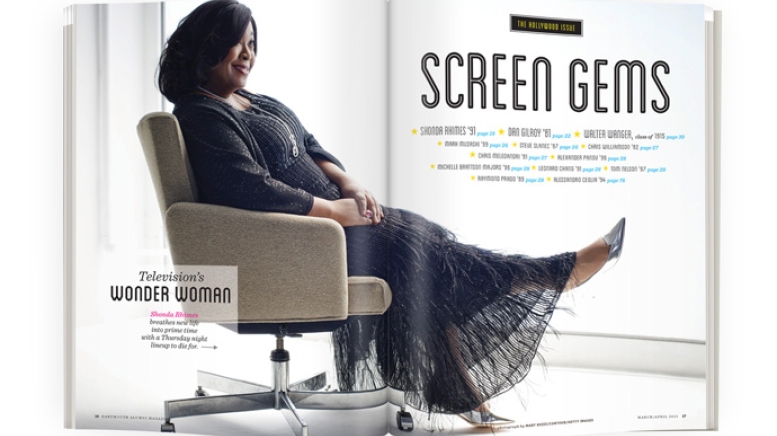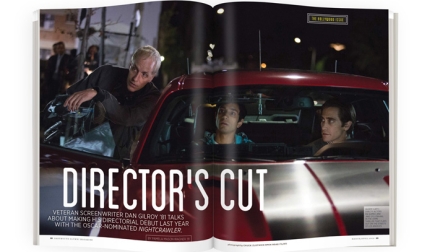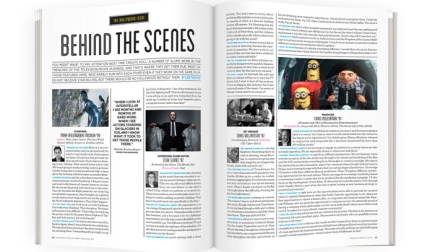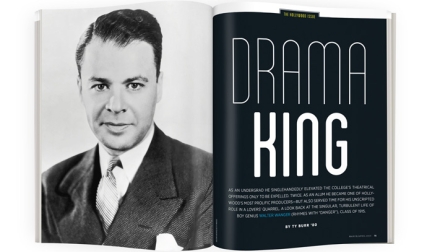If you’re thinking of asking Shonda Rhimes for any favors, you had better act fast. Because after the TV mogul gives a talk at March’s TED conference in Vancouver, her “year of yeses,” as she calls it, is coming to a close. The dare started around Christmas of 2013, when her sister, Delorse, chided Rhimes for turning down too much. “So my New Year’s resolution was to say yes to the things that scare me,” says Rhimes. The first call she got happened to be from President Philip Hanlon ’77, who asked her to give Dartmouth’s 2014 Commencement speech. “I thought, ‘That sounds terrifying!’ ” says Rhimes. “I don’t like public speaking, so to give the Dartmouth commencement speech? That’s insane. As soon as I hung up the phone, I was like, ‘I can’t believe I said yes to that!’ ”
Ushered past the ShondaLand sign on the wall of her production company’s waiting area, one feels lucky to be on the other side of one of those yeses. Agreeing to an interview with DAM, Rhimes is open and warm as she settles in for a chat in one of the comfy chairs in her large but homey office at the Sunset Gower studio lot in Hollywood in early December. “This used to be Warren Beatty’s office,” she says. “I think he’d like that a chick is in here now.” This isn’t just any chick, though. As the creator of the smart, sexy medical drama Grey’s Anatomy and the fast-paced political thriller Scandal and the executive producer of the law school whodunnit How to Get Away with Murder, her name is now behind the entire ABC Thursday night lineup, helping the network win its highest ratings in five years. As the headline on her recent Hollywood Reporter cover put it: “This Is TV’s Savior.”
Indeed, Friday mornings at the water cooler have been a lot more fun since the TGIT (“Thank God it’s Thursday”) trifecta hit the small screen last fall. “Shonda is remarkable not only because her shows are great, but you feel like you will be left out of a major cultural moment if you miss a single episode,” says fellow writer and showrunner Mindy Kaling ’01, who got a yes from Rhimes last fall when Kaling asked her to appear as a guest on The Mindy Project. “It’s incredibly rare to make a show people love. It’s rarer still to make a show people need to see. And yet she keeps doing it.”
Chandra Wilson, who plays no-nonsense surgeon Miranda Bailey on Grey’s, praises Rhimes’ gift for the element of surprise. “Every time I think I know where something is going, she’ll turn it in another direction,” she says. “She’s not afraid of taking things forward and being open to new possibilities all the time.”
Rhimes herself pays no attention to any accolades. “I read nothing that is written about me,” she says. “What purpose does it serve me to read something like, ‘Oh they love me….’ That’s just weird bathing in your own ego. And then if you want to believe the good stuff, you have to believe the bad stuff, so I just don’t read any of it. It’s none of my business what anyone thinks of me. And the outside world has nothing to do with the stories I’m telling.”
With some of the most diverse casts on TV and characters that aren’t hooking up just within their own race or with the opposite gender, Rhimes breaks every outdated and unspoken rule she can. “Everybody gets to have a love life. Everybody gets to be a three-dimensional person. Everybody gets to be fulfilled,” says Rhimes, who received GLAAD’s Golden Gate Award in 2012 for her work in increasing the visibility and understanding of the lesbian, gay, bisexual and transgender community. “I have many, many gay friends. And it feels really weird to me, in this world in which there are many people who are gay, that we would just pretend they don’t exist.”
Fight her on that and you’re in for a bruising. One Twitter follower griped that the “gay scenes” in the ShondaLand lineup are “too much.” Rhimes, who has 800,000-plus followers, was quick to fire back. “If u use the phrase ‘gay scenes,’ u are not only LATE to the party but also NOT INVITED to the party,” she tweeted in response.
“It’s so inappropriate. It’s like saying, ‘Why do you have so many black scenes or so many women scenes?’ ” she says. “People will also say, ‘Oh, the sex is really graphic.’ I’m fascinated by that statement, because they don’t mean that the sex is really graphic. We’re not showing any different behavior than we would in any sex scene. What they’re saying is that the people who are having the sex is what makes it graphic to them—and that’s offensive to me.”
The positive feedback she gets from viewers is more motivating, as when one character on Grey’s came out as a lesbian in 2008. “I remember getting a lot of letters from girls who were like, ‘You gave me the language to talk to my parents about the fact that I was gay. You gave my parents the language to accept me and understand what I was going through,’ ” recalls Rhimes, her eyes welling up. “That was really amazing. That felt really good to me.”
As for which shows appeal to her, she lists a few with similar no-holds-barred writing, such as Lena Dunham’s HBO hit, Girls. “I think it’s really bold and really interesting,” Rhimes says. “She’s fearless.” Game of Thrones, created and written by David Benioff ’92, is another favorite, as well as Jenji Kohan’s Orange Is the New Black and Kaling’s comedy, The Mindy Project. “I watch that religiously, because it’s just funny,” Rhimes says.
Portraying a fictionalized version of herself on Kaling’s sitcom last October “was a surreal experience,” says Rhimes, who isn’t really Dartmouth’s alumni beer pong champ, as portrayed on The Mindy Project—although she did enjoy her share of partying as a student. Rhimes only agreed to the role because it fell within that year of saying yes. When it came time to deliver her lines, however, she was “suddenly paralyzed.” For the first time, she says, “I was on the other side of the camera and realized I had no clue what I was doing.” (Nonsense, Kaling insists. “She has the best timing. I would have her on every week if I could.”)
Rhimes, who turned 45 in January, feels equally ill at ease when she’s recognized in public, and, perhaps as a result of more appearances, whether it’s doing a bit on Jimmy Kimmel Live! or offering those words of wisdom from that stage in front of Baker Library last June, she’s being spotted more and more. “I find it really startling,” she says. “The idea that people know who I am and they stare, it’s just weird. That’s never been any writer’s dream ever. I should hope not, anyway.”
As a result, she rarely goes out. If you’re planning on catching her sipping cocktails at the Soho House or any other L.A. hot spot, you might be waiting a while. More likely she’s home with her biggest fans: daughters Harper, 12, Emerson, 3, and Beckett, 18 months. Hanging with her kids is what brings the biggest smile to her face these days. “I am at Disneyland and I am wearing sparkly Minnie Mouse ears and it is shocking how happy it is making me,” Rhimes tweeted at the end of December. The girls are the reason she no longer works on weekends. “Harper was like, ‘You work too much!’ and I suddenly realized that I was going to miss everything,” she says. “The minute you get into the habit of not working on the weekend, it becomes really hard to start again.”
The single mom praises her strong support network of two nannies and two nearby sisters for their help on the home front. Without them, “I would not be wearing clothes or eating food or raising my children in any decent way,” says Rhimes, whose office has a toy bin along with many photos and by her girls’ framed art. “They make it possible for me to be a functioning, good mother. It’s important to talk about that.”
So important that she’s penning a memoir for Simon & Schuster focusing on single motherhood that’s due later this year. Going through the adoption process with Harper and Emerson, and having Beckett with the help of a surrogate, Rhimes is asked often how to navigate the nontraditional route of parenthood. “I’ve basically been shepherding all these women I know on how you become a single mother,” she says. “So much so that somebody gave me business cards that say ‘Adoption Doula.’ I thought that was really cute.”
She’s still a little unsure of how to navigate the dating scene, however. “I try to date, but it’s weird,” Rhimes says. She giggles, recalling a dinner conversation a few years ago with Tyra Banks, who told her to try Match.com. “I thought, ‘Tyra Banks told me it’s okay, so I’m going to do it!’” Helming hit TV shows took priority over crafting a dating profile, of course, and now it’s all about the iPhone app Tinder anyway. “Okay, so wait,” she says. “My friends and I had this long discussion of whether I can be on Tinder—and I do see some well-known faces on Tinder—but I asked my publicist and he was like, ‘You cannot get on Tinder. Please do not get on Tinder.’ ”
Her circle of friends is small but tight and the relationships go way back. “I love them because they never, ever, ever want to talk about television—we mostly talk about boys,” she says. One of her closest pals is Zola Mashariki ’94, a senior VP at Fox Searchlight, who says that Rhimes is still the same girl she knew at Dartmouth. “Even though her star has risen and she’s getting this much-deserved acclaim and fame, she’s still the one who picks up her nephews at the airport, she’s the one I cook with on Sundays or just talk with ad nauseam. And if anything happens to me or my kids, she’s the one I call on,” says Mashariki. “I remember watching an episode of Grey’s and hearing one character say to the other, ‘You’re my person,’ and I thought, ‘Yep, that’s us.’ That was so meaningful to me because Shonda is absolutely my person.”
They met when Rhimes was a senior and a director of the Black Underground Theater Association (BUTA). She cast Mashariki, a freshman, in the play Spell #7. After a few rehearsals Mashariki felt it was going to require too much time and asked to bow out. No chance. “I dare anyone to quit something of Shonda’s,” she laughs. “I’m pretty strong willed, but when I tried to leave she just gave me a great, cold stare and said, ‘You made a commitment so you are doing this. See you at rehearsal and goodbye.’ ”
Drama professor Mara Sabinson also recalls being impressed with Rhimes’ leadership skills, even at such a young age. “What I remember most was how respected Shonda was among her peers,” she says of Rhimes, who has been named twice to Time’s 100 Most Influential People list. “She told the BUTA actors they had to take my acting class—and they did.”
Returning to Hanover last June to deliver her commencement speech was a huge moment. Rhimes hadn’t been back since driving through town about 16 years ago on the way to her brother’s wedding in Vermont. She didn’t even stop the car. “I said, ‘There’s a Gap store on the Green! Everything’s changed!’ ” recalls Rhimes. This time was more nostalgic. Rhimes, who brought Mashariki and two other close friends with her, was swept back to her days of watching the snow fall outside Baker Library and the beautiful walks from her dorm in the River Cluster. “I just stood there and went ‘ahh’ and remembered how happy I was there,” says Rhimes, who majored in English with a concentration in creative writing. “When I graduated I really was the kid who cried while my mother helped me pack my stuff.”
She credits Dartmouth for making her the fearless leader she is today (she oversees some 800 actors, writers, crew members and producers). “One of the reasons I think I have been successful in Hollywood is because I’m always comfortable in a room full of frat guys. I’ve never been a shrinking violet in any room, because I went to Dartmouth. Dartmouth really gave me something that I don’t think I would have had otherwise. I can run with the dogs—the big dogs—because of that.”
President Hanlon asked if she’d like to come back to teach at some point, either for a semester or a week or even a day. “That sounds kind of cool,” says Rhimes, who is a member of the Centennial Circle of Alumnae, which raised $14.8 million for the College last year. “I’d like to be more involved, because the students really move me.” Concerned that the undergrads today are ill-prepared for the real world, the writer (who recently received the Writer’s Guild award for television writing achievement) handed Hanlon a good line for his next group of incoming freshmen. “I was like, ‘You need to tell them at the beginning when they walk in the door: This is your lab school for the world. This is your lab school for learning to deal with each other,’ ” she says. “One girl I met, she was like, ‘I was the only woman in my sociology class. It was sooo hard.’ I was like, ‘A lot of times you’re going to be the only woman in the room. This is the place where you learn how to not be afraid of that!’ ”
The youngest of six kids raised in the suburbs of Chicago, Rhimes says her parents, both in academia, were supportive of whatever she wanted to pursue. “I love that about them,” she says. “I remember reading my dad a poem for his birthday one year and him being like, ‘That’s the greatest thing in the world.’ ” Still, she was wary of telling them she wanted to pursue a career in what’s typically not a very lucrative field, so she took a job in advertising instead. Then she read an article in The New York Times that said it was harder to get into USC film school than Harvard law school. Naturally, she applied.
Working as a development assistant after getting her degree, Rhimes was so broke she was selling off her CD collection to buy gas. She was about to pack it all in to pursue a career in medicine when she got word that a script she wrote called Human Seeking Same had been optioned. Good thing, too. “Let’s be clear—I am scientifically challenged. There’s no way I could have made it through medical school,” she says. The check earned her enough money to stay in L.A. and a foot in the door. Soon she was getting writing jobs, including 1999’s Introducing Dorothy Dandridge, which starred Halle Berry. She later wrote the Britney Spears movie Crossroads (2002) and The Princess Diaries 2 (2004).
Grey’s Anatomy debuted in 2005 and was an instant hit. Terms such as “McDreamy” landed in the pop culture lexicon, and the show even led to a spinoff: Private Practice, which ran for six seasons. “Her words are just exhilarating to deliver,” says Wilson. So what’s the secret to crafting such addictive plot lines? Rhimes says one of her favorite writing rules is to “pretend everyone you love is dead.” And yes, she’ll often use events in her friends’ lives as material, but somehow those friends rarely catch on. “I had one friend tell me a story about some relationship moment she was having and I said, ‘I cannot wait to put that in!’ and she said, ‘Don’t you dare write about my relationship.’ I sat there in a moment of shock because I couldn’t believe she didn’t realize that I had written nothing but about her relationship. People don’t recognize themselves.”
Despite her position now as a primetime powerhouse, Rhimes says not all her ideas are gold. Like the one she ran by Disney CEO Bob Iger while on his plane seven years ago (Disney is ABC’s parent company). “I pitched an idea about a baking competition judged by celebrities, where the next day the winning product would be sold at Starbucks,” she says. “He told me to be quiet and stick to dramas.” Another idea? “I’m obsessed with old people. So it’s this show where these old people are bored out of their minds in a nursing home and one of them has a grandchild who’s a terrible homicide detective and they steal his cases,” she says. “The network won’t officially pass because they’re afraid I’ll take it somewhere else, which is funny. It’s kind of a running joke.”
Right now Rhimes needs to get back to writing the shows that are definite winners. Although she’s responsible for signing off on hundreds of decisions, from casting to editing to approving Scandal’s new clothing collection at The Limited, her favorite spot is still in front of the keyboard. She fires up her music, ranging from Bach to Taylor Swift, and off she goes. “If I have headphones on I can immediately start writing,” she says. “I’m like Pavlov’s dog.” Even with all her success, sitting down and doing the work is what it all comes down to—and she still worries it could disappear at any moment. Asked when she realized she was going to make it in Hollywood, she says, “I’m still hoping I do. I think if you’re a competitive person at all, you can’t take anything for granted.”
Jennifer Wulff is a member of the DAM advisory board. She lives in Wilton, Connecticut.




